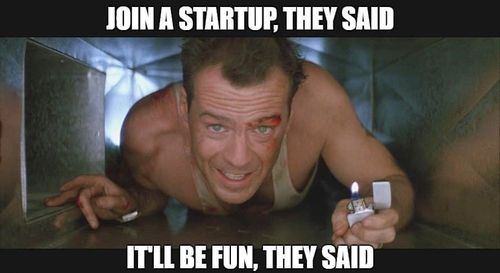Why do your tech startups fail?

Jenn К
author of all this stuff
“Is starting a startup difficult?”
“Not at all. It’s like riding a bike. On a bike that burns, and you burn, and you’re in hell.”
Let's be realistic and put up with the fact that 90% of startups, whether it's tech or non-tech, are failing. Obviously, each project has its own reasons and causative agents of failure, but most often they can be somehow classified. Let's look at some of the head causes of startups that fail at least to minimize their repetition, for example, with your project.
Mistake 1. “Lack of money or financing.”
The reason for the lack of funds and financing at different stages of startup development can be both the initially incorrectly constructed and calculated financial plan of the project, and the inability to handle money. If you have never worked with money before, then it is better to entrust this business to a professional. But it’s not always a matter of money alone; we will consider other reasons that doom a startup to failure.
Mistake 2. “Focus on the product, not the customers.”
When you have an idea to create/build/implement something with a plan to receive financial benefits in the future, you should understand who you want to receive this benefit from and whether your product will benefit them. I mean, that when you start a startup, you should analyze how your product meets the needs of the market and customers.
This is very important because 42% of startups fail because they do not solve the needs of the market. The only way you’ll be able to grow your startup healthy and robust is by combining building with user/market research. By embracing feedback, you open yourself up to enormous opportunities and fresh ideas.
Mistake 3. “Lack of focus.”
When you are working on creating or launching a startup, it is effortless to drown in a heap of affairs that will pull you in different directions and thus disperse your attention. It’s best not to rush and do it one at a time, especially if you don’t have assistants or partners.
Having only 24 hours in a day is impossible to catch everything. The desire to do everything and get everything and fight it off usually leads not only to the death of a startup but also to the moral exhaustion of a startup. Slowly but confidently moving towards the goal, you will achieve much more.
Focus on important issues, and don’t let things go by themselves.
Mistake 4. “One-Person Team.”
Often, startups try to independently realize all their plans, which often causes losing. To be as successful as possible, it is necessary to satisfy the clients needs as much as possible, by creating the product that the market needs. But as practice shows, one person is usually catastrophically small to carry out a startup. A successful business must rest on at least 3 turtles: a designer, engineer, and marketer. Again, based on practice, it is worth noting that a balanced team with an engineer and a marketer has 2.9 times more users than an unbalanced squad. Also, teamwork can inspire you to new ideas and further successful business development, because as you know, two heads are better than one. But be careful when choosing a team, a lack of team unity can be a severe obstacle to successful business development.
Mistake 5. “Wrong location.”
What does it ever mean you may ask? And I will say that you should not miss such a seemingly inconspicuous reason for the fall of a startup. There must be a match between the concept and the location of your startup. Most often, the wrong location leads to the fact that the startup becomes local and challenging to bring to a “broad” market.
Mistake6. “Poor marketing.”
When we talk about startups, we mean a business that almost no one knows and has never heard of, so poor marketing can be one of the most fatal reasons for a startup to develop. What is meant? And the fact that if no one knows about your product, it doesn’t matter how wonderful, revolutionary, progressive and one of a kind ... no one will know about it. Try to draw as much attention as possible to your project, fortunately nowadays there are all the possibilities for this. Do not underestimate marketing because your competitors will not repeat this mistake.
All of these mistakes seem to be obvious, but at the same time, they are committed by young startups and unfortunately often lead to defeat. Take note of them, I hope they were useful to you.
Bad shit is coming. It always is in a startup. The odds of getting from launch to liquidity without some kind of disaster happening are one in a thousand. So don't get demoralized."--Paul Graham, co-founder of Y Combinator

Jenn К
Author bio: author of all this stuff
